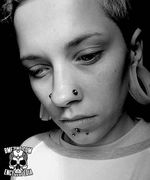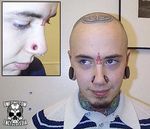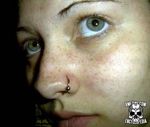Nostril Piercing
The nostril piercing is, on a global and historical level, the most common piercing next to the earlobe piercing.
Contents |
Procedure
It is usually performed with a needle in 18ga to 14ga. These piercings can be pierced larger and dermal punched or stretched to larger gauges; large-gauge nostril piercings are becoming more common.
Jewelry
For healing, the recommended jewelry is a captive ball ring or a nostril screw.
Longterm Health Issues
With regard to large-gauge nostril piercings, IAM: total says of his 5/8" nostril piercings that he "definitely" gets colds and allergic symptoms more often, because of the increased vulnerability of his nasal passages to pathogens and allergens such as pollens and dust.
History
Paul King adds,
- We know that nostril piercing has been practiced by traditional people in both North and South America. Our earliest recordings are from the Christian Bible and the holy texts of the Vedas, brought to India with the invasion of the Nordic Aryan Tribes around 1500 BCE. India is, of course, most famous for nostril piercings. Through the centuries in India this piercing has gone in and out of fashion — in more recent times, on a Hindu girl's eve of marriage she'd often have her left nostril pierced.
The Apa Tani women of Northeastern India have the biggest nostril piercings with enlargements of up to 1.5". Some men in New Guinea also have very large nostril piercings — in PFIQ #6 a man is pictured with over 1" plug in each nostril.
Trivia
Thrillen in Middle English is an alteration of thirlen (to pierce), which comes from the Old English thyrlian, which comes from thyrel (hole). Because of that, nostrils were known as "nosethrils", literally "nose hole". (Bob Flanagan contributed this information to PFIQ #26.)




